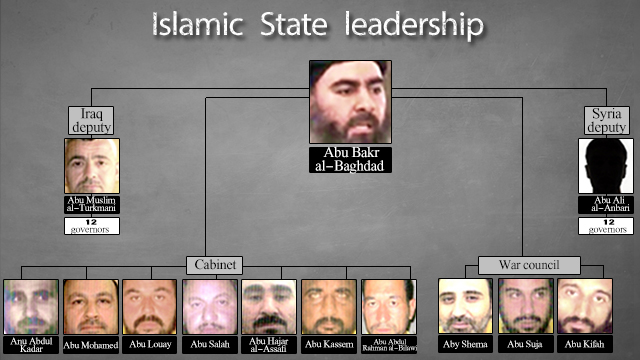SANLIURFA, Turkey — When Abu Hamza, a former Syrian rebel, agreed to join the Islamic State, he did so assuming he would become a part of the group’s promised Islamist utopia, which has lured foreign jihadists from around the globe.
Instead, he found himself being supervised by an Iraqi emir and receiving orders from shadowy Iraqis who moved in and out of the battlefield in Syria. When Abu Hamza disagreed with fellow commanders at an Islamic State meeting last year, he said, he was placed under arrest on the orders of a masked Iraqi man who had sat silently through the proceedings, listening and taking notes.
Abu Hamza, who became the group’s ruler in a small community in Syria, never discovered the Iraqis’ real identities, which were cloaked by code names or simply not revealed. All of the men, however, were former Iraqi officers who had served under Saddam Hussein, including the masked man, who had once worked for an Iraqi intelligence agency and now belonged to the Islamic State’s own shadowy security service, he said.
His account, and those of others who have lived with or fought against the Islamic State over the past two years, underscore the pervasive role played by members of Iraq’s former Baathist army in an organization more typically associated with flamboyant foreign jihadists and the gruesome videos in which they star.
Even with the influx of thousands of foreign fighters, almost all of the leaders of the Islamic State are former Iraqi officers, including the members of its shadowy military and security committees, and the majority of its emirs and princes, according to Iraqis, Syrians and analysts who study the group.
They have brought to the organization the military expertise and some of the agendas of the former Baathists, as well as the smuggling networks developed to avoid sanctions in the 1990s and which now facilitate the Islamic State’s illicit oil trading.
In Syria, local “emirs” are typically shadowed by a deputy who is Iraqi and makes the real decisions, said Abu Hamza, who fled to Turkey last summer after growing disillusioned with the group. He uses a pseudonym because he fears for his safety.
“All the decision makers are Iraqi, and most of them are former Iraqi officers. The Iraqi officers are in command, and they make the tactics and the battle plans,” he said. “But the Iraqis themselves don’t fight. They put the foreign fighters on the front lines.”
The public profile of the foreign jihadists frequently obscures the Islamic State’s roots in the bloody recent history of Iraq, its brutal excesses as much a symptom as a cause of the country’s woes.
The raw cruelty of Hussein’s Baathist regime, the disbandment of the Iraqi army after the U.S.-led invasion in 2003, the subsequent insurgency and the marginalization of Sunni Iraqis by the Shiite-dominated government all are intertwined with the Islamic State’s ascent, said Hassan Hassan, a Dubai-based analyst and co-author of the book “ISIS: Inside the Army of Terror.”
“A lot of people think of the Islamic State as a terrorist group, and it’s not useful,” Hassan said. “It is a terrorist group, but it is more than that. It is a homegrown Iraqi insurgency, and it is organic to Iraq.”
The de-Baathification law promulgated by L. Paul Bremer, Iraq’s American ruler in 2003, has long been identified as one of the contributors to the original insurgency. At a stroke, 400,000 members of the defeated Iraqi army were barred from government employment, denied pensions — and also allowed to keep their guns.
The U.S. military failed in the early years to recognize the role the disbanded Baathist officers would eventually come to play in the extremist group, eclipsing the foreign fighters whom American officials preferred to blame, said Col. Joel Rayburn, a senior fellow at the National Defense University who served as an adviser to top generals in Iraq and describes the links between Baathists and the Islamic State in his book, “Iraq After America.”
The U.S. military always knew that the former Baathist officers had joined other insurgent groups and were giving tactical support to the Al Qaeda in Iraq affiliate, the precursor to the Islamic State, he said. But American officials didn’t anticipate that they would become not only adjuncts to al-Qaeda, but core members of the jihadist group.
[Islamic State appears to be fraying from within]
“We might have been able to come up with ways to head off the fusion, the completion of the Iraqization process,” he said. The former officers were probably not reconcilable, “but it was the labeling of them as irrelevant that was the mistake.”
Under the leadership of Abu Bakr al-Baghdadi, the Islamic State’s self-proclaimed caliph, the former officers became more than relevant. They were instrumental in the group’s rebirth from the defeats inflicted on insurgents by the U.S. military, which is now back in Iraq bombing many of the same men it had already fought twice before.








